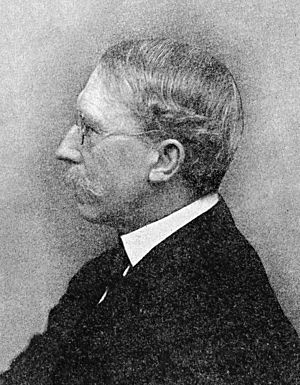Francis Gotch facts for kids
Francis Gotch (born July 13, 1853 – died July 15, 1913) was a British scientist who studied how the brain and nerves work. This field is called neurophysiology. He was a professor of physiology, which is the study of how living things function, at University College Liverpool and Oxford University. He made important discoveries about how our brains and nerves send messages.
Contents
Who Was Francis Gotch?
Francis Gotch was a very important figure in the early days of understanding the nervous system. He helped us learn more about how our brains control our bodies and how nerve signals travel. His work laid the groundwork for many things we know about the brain today.
Early Life and Education
Francis Gotch went to Amersham Hall School when he was younger. After that, he studied at London University. He earned his first degree, a B.A., in 1873, and then a B.Sc. Later, he decided to study medicine. He became a qualified surgeon in 1881, earning the title M.R.C.S.. This strong education in both science and medicine helped him greatly in his future research.
Amazing Brain Discoveries
Francis Gotch made several groundbreaking discoveries in British neurophysiology. He was one of the first to explore how our brains and nerves communicate. His research helped scientists understand the electrical nature of nerve signals.
Working with Victor Horsley
Gotch worked closely with his brother-in-law, Victor Horsley, who was also a famous scientist. Together, they did research on how different parts of the brain control specific actions. They used electrical stimulation on the cerebral cortex (the outer layer of the brain) to see which parts were responsible for different functions. They also showed that the mammalian brain (like the brains of humans or animals) could actually produce its own electric current. This was a huge discovery!
Understanding Nerve Signals
In 1899, Francis Gotch described something very important about nerve impulses. He found that after a nerve sends a signal, there's a short period where it can't send another one right away. He called this the "inexcitable" or "refractory phase." Imagine a light switch that needs a moment to reset after you flip it. This phase ensures that nerve signals travel in one direction and don't get mixed up. He also did significant research in electroretinography, which is a way to measure the electrical activity of the eye's retina.
Honored for His Work
Francis Gotch's important work was recognized by other scientists. In 1891, he and Horsley gave a special talk called the Croonian Lecture to the Royal Society of London. Their lecture was titled "On The Mammalian Nervous System: Its Functions, And Their Localization Determined By An Electrical Method." This showed how important their electrical studies of the brain were. In June 1892, he was elected a Fellow of the Royal Society, which is a great honor for a scientist in Britain.
Francis Gotch passed away on July 15, 1913, and was buried at Wolvercote Cemetery.
 | Victor J. Glover |
 | Yvonne Cagle |
 | Jeanette Epps |
 | Bernard A. Harris Jr. |


